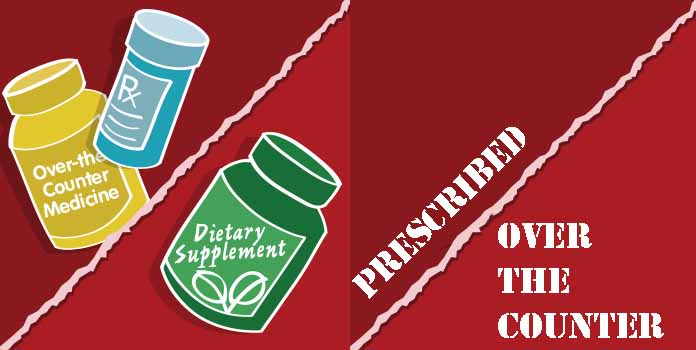Many of us are very serious in losing weight but we experience one tiny problem: “Confusion”! We open TV to find a somewhat magical fat burner that will cure all our bellies away. Go to Wal-mart, Target, GNC or any mega stores and find tons of over the counter weight loss supplements and all claim they work.
Check online to find many “prescription weight loss pills” are being advised by various physicians.
For normal people like us, the part of our brain that is responsible for decision making really gets pissed and confused.
Table Of Contents
What’s the difference between Prescription and non-prescription weight loss pills?
Prescribed weight loss drugs basically alter the chemicals in our brains.
The brain is made up of about 100 billion neurons, also known as nerve cells.
Neurons communicate with each other by using chemical messengers called neurotransmitters. There are many types of neurotransmitters, and each one carries a specific message.
Neurotransmitters deliver their messages by attaching to special places on nerve cells called receptors. Prescription drugs act by mimicking certain neurotransmitters.
Main Downside: Your brain and body no longer function naturally; they are under the influence of risky prescribed pills.
That’s Why; Many stimulant-type weight loss medications like phentermine or diethylpropion are only recommended for short-term use (up to 12 weeks) due to the risk of dependence and other side effects.
Common Types of Prescribed Weight Loss Pills
- Orlistat – Over the counter diet pill that claims to reduce fat absorption in the body
- Sibutramine – Appetite suppressant that has risk of causing heart attacks and stroke
- Rimonabant – Decreases appetite and increases energy expenditure. Not approved in United States as an anti-obesity drug
- Metformin – Reduces the amount of glucose that is produced by the liver
- Exenatide - Used for patients with obesity and type 2 diabetes
- Phentermine + topiramate – Also approved in 2012, this drug combination is sold under the brand name Qsymia. Phentermine is a stimulant that decreases appetite; topiramate is an anti-seizure and migraine drug that also decreases appetite and causes feelings of fullness.
It’s Safe Because it’s FDA approved… Right?
Prescribed weight loss with FDA approval fit into one of two categories. They are either fat blockers or appetite suppressants.
However, even with FDA approval, diet drugs are not miracle cures, nor are they without undesirable side effects.
However, if FDA grants approval, it means the agency has determined that the benefits of the product outweigh the risks for the intended use.
Weight loss drugs Designed For?
Guidelines suggest that clinicians consider prescribing an obesity drug in patients with a body mass index (BMI) over 30 if they have no other weight-related conditions.
Benefits Vs Risks… Is It Worth It?
|
Pros |
Cons |
The most widely prescribed weight-loss drug, phentermine now it’s (Phentermine + topiramate ) is approved for short-term therapy (a few weeks) in people with a BMI over 30 and people with a BMI of 27 who also have significant risk factors for heart disease and diabetes.
What’s worrisome is that many people use phentermine “off-label” for much longer than the recommended period.
It’s a risky move, says Eric Colman, M.D., medical team leader of the U.S. Food and Drug Administration’s Division of Metabolic and Endocrinology Products. He notes that the drug can cause, among other effects, high blood pressure.
Any good Prescribed weight loss pills alternative on the market?
When it comes to an alternative, people prefer to look for OTC weight loss pills. As it’s hassle-free and even if there were side-effects it’s not as serious as the prescribed ones. Plus the cost is definitely a major pro over prescribed weight loss pills!
The decision highly depends on what people want from the diet pill, you can always look at the top selling otc diet pills in UK . However here is a brief summary;
Phen375 or PhenQ (Phentermine, Contrave or Qsymia alternative)
Both pills have clinically-tested ingredients, which have been shown to help boost fat loss and accelerate metabolism. Also, we can’t find any complaints of harmful side effects and customer comments show that people are seeing solid results.
Kindly refer to this article to know the difference between PhenQ and Phen375.
Garcinia Cambogia pill (Sibutramine & Rimonabant alternative)
The active ingredient in the fruit’s rind, hydroxycitric acid, or HCA, has boosted fat-burning and cut back appetite in studies.
It appears to block an enzyme called citrate lyase, which your body uses to make fat. It also raises levels of the brain chemical serotonin, which may make you feel less hungry.
Side-effects: rare
Shipping: Free World Wide
Money Back Guarantee: 60 days
Full User/Dr Review: Garcinia Cambogia Pills Full Review
Official Website: Click Here
What About Other OTC Weight Loss Pills?
There are over 100k OTC weight loss pills on the market. and that’s one of the major cons of OTC pills.
Any company can open any day and sell their pills to the crowd. The more problematic part is 80% of these pills do not work and has no value at all. Some even do harm to kidneys and alters its metabolism.
If we stated all the OTC weight loss pills here, it would be an endless article.
However, we choose only two for you to review and also to know what standards are they graded on to be a better reference for your future decisions when deciding on weight loss supplements.

